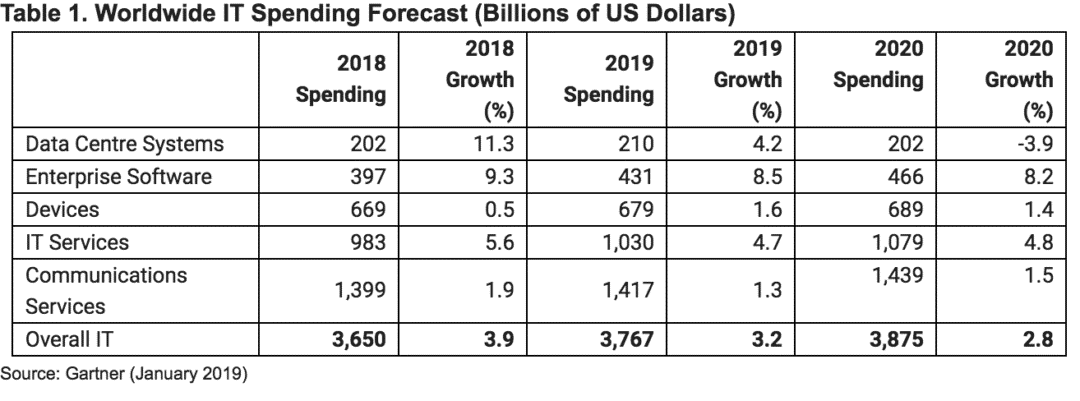BREXIT and IT: To invest or not to invest?

22 February 2019
BREXIT
and IT: To invest or not to invest?

According to respected market analysts
Gartner, Global IT spending is set to increase despite Brexit, recession and
tariff rumours.
Gartner predicts global IT spending will
reach $3.8 trillion in 2019, an increase of 3.2% from 2018.
Thanks to the shift to the cloud,
enterprise software will carry on growing in popularity, worldwide spending in
this area is projected to grow 8.5% in 2019.
Despite uncertainty fuelled by recession
rumours, Brexit, and trade wars and tariffs, the likely scenario for IT
spending in 2019 is growth. Well, at least that’s what John-David
Lovelock, research vice president at Gartner, thinks. Gartner says in 2019, IT spending is
projected to total $3.76 trillion, an increase of 3.2% from 2018.
However, according to Lovelock, there
are a lot of dynamic changes happening in regards to which segments will be
driving growth in the future.
He said: “Spending is moving from saturated
segments such as mobile phones, PCs and on-premises data centre infrastructure
to cloud services and Internet of Things (IoT) devices. IoT devices, in
particular, are starting to pick up the slack from devices. Where the devices
segment is saturated, IoT is not.”
Serverless
computing, AI, network agility, edge computing, the death of the data centre,
new roles, SaaS denial, talent management and global infrastructure drive the
Gartner top 10 infrastructure and operations trends for 2019.
“IT is no longer just a platform that
enables organisations to run their business on. It is becoming the engine that
moves the business,” added Mr Lovelock. “As digital business and digital business ecosystems move forward, IT will be the
thing that binds the business together.”
Thanks to this shift to the cloud,
enterprise software will carry on growing in popularity, worldwide spending in
this area is projected to grow 8.5 per cent in 2019. It will grow another 8.2%
in 2020 to a total $466 billion (see Table below).

Despite decline in the mobile phone
market, overall, the device market is set to grow 1.6 per cent in 2019.
“In addition to buying behaviour changes,
we are also seeing skills of internal staff beginning to lag as organisations
adopt new technologies, such as IoT devices, to drive digital business,” said
Mr Lovelock. “Nearly half of the IT workforce is in urgent need of developing
skills or competencies to support their digital business initiatives. Skill
requirements to keep up, such as artificial intelligence (AI), machine
learning, API and services platform design and data science, are changing
faster than we’ve ever seen before.”
Blockchain, artificial intelligence,
empowered edge, privacy and ethics, quantum computing, immersive experiences,
augmented analytics, autonomous things and digital twins drive the Gartner Top
10 Strategic Technology Trends for 2019. Many emerging technologies, pertinent
to the supply chain, will be investigated in more depth in a series of Technical
Bulletins from Touchstar Technologies (see http://www.touchstarpod.com/blog).
IT Strategies
for Brexit
If the ‘gloom and doom’
predictions prove correct and Brexit helps to trigger another recessionary
period, notably for the UK, why on earth would business organisations
contemplate spending increases? With scary economic numbers
projected, IT might feel inclined to panic. But now is the time to stand tough,
advises Andrew Reichman, senior analyst at Forrester Research. "Companies
should tighten their belts, not take their pants off," he admonishes.
IT heads of department have to come up with “better
reasons" for the technologies to which they allocate IT resources but must continue
investing in certain areas, no matter how crazily the economy bounces up or
down.
Doing this means taking a
comprehensive view of organisational expenses and prioritising. Understanding
which technology investments help to increase productivity and better serve
clients is the first step. Continuing to fund these strategic technologies
during an economic downturn is very important. With a recession technology plan
in place, your organisation can survive, and even thrive, within this turbulent
economy.
Here are three steps to take when
putting together your IT strategy for the slowing economy.
Step 1: Re-evaluate Your Needs
Treat recession planning like
budget planning. Changing economic conditions require a change in thinking.
Just as you re-evaluate your expenses from the previous year when planning for
a new fiscal year, you need to re-evaluate your current operating budget during
a recession.
Ask yourself the following questions:
·
- What technology must be maintained or implemented that makes you
indispensable to your customers or partners? Your target markets will be feeling the recession
too; you want to make sure their relationship with your organisation continues
by providing efficient, affordable, and premium service.
·
- Do you have technology in place that is instrumental in helping you
attract new customers and retain current ones? Your bottom line is key in a
recession. Since any additions will greatly impact the bottom line, consider
maintaining technology that supports customer retention throughout the economic
downturn.
·
- Is your current method of technology and network support working for
you? Is it
cost-effective? Efficient? If not, it may be time to consider other options.
Rebalance technology investments by looking at the comprehensive picture. Don’t
focus on shutting them down; focus on making strategic IT investments.
Step 2: Stretch Your IT Pounds
If yours is like most organisations,
it needs to make budgeted IT pounds go further. Here are a few ways:
·
- Save on upgrades: Wait to make any noncritical upgrades until after the recession is
over.
- Stretch equipment life cycles: Workstations usually have a three-year life cycle.
During a recession it is OK to stretch this to four years, though you may want
to consider minor upgrades such as increasing RAM.
- Review software licensing and support agreements: As part of your re-evaluation,
you should take time to review all of your organisation’s software licensing
and support agreements to make sure you are not paying for duplicate coverage.
Step 3: Spend Smart
In a recession
Organisations
often panic and tighten their belts to the point of passing out; and then they
are down for the count. So whatever your IT strategy for dealing with an
economic downturn, don’t be cheap. Good spending does
exist and it comes in the form of IT investments that will add to your organisation’s
productivity.
Here are five IT investments you should consider, even
during a recession:
·
- Security investments: Protect your company with firewalls, Microsoft
patching, antivirus and spyware protection, and so forth. It’s critical to
maintain all services that are protecting your network and keeping your systems
up and running because no organisation can afford a loss in productivity,
especially during a recession.
- Warranties: If you
are stretching the lifetime of your hardware, you should not skimp on hardware
maintenance. Be sure to extend your warranties.
- Proactive IT service: Without proactive monitoring, problems are much
more likely. This is even more important during a recession because calling
your IT service provider only when something goes wrong incurs much higher
service costs.
- Backup and disaster recovery mechanisms: Ensure your backup and disaster
recovery systems are working well. You don’t want operations to stop during a
recession should something happen with your front-line business applications.
- Line of business applications: For all businesses, this means continuing to
support technologies such as supply chain software that make the operation more
efficient. Continued productivity is key in slow economies.
Touchstar Technologies provide IT solutions that are proven to improve
operational efficiency and directly impact the bottom line. We invite you, as
an integral part of your IT review process, to examine the case studies and
user testimonies within this website …. they could be key to your survival!
Sources:
https://www.information-age.com and https://www.allbusiness.com